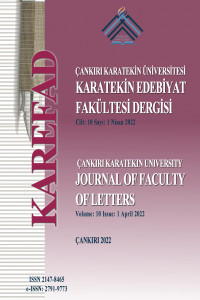Pers Kralı Büyük Kyros’un (MÖ 559-530) Orta Asya Seferleri ve Ölümü
Büyük Kyros’un (MÖ 559-530) Orta Asya seferleri hakkındaki bilgiler Antik Çağ yazarları vasıtasıyla günümüze ulaşmıştır. Bu bilgiler bahsi geçen seferlerin kronolojisi konusunda farklı tarihler vermektedir. Buna karşın eldeki verilerden belirli bir tarihlendirme yapmak mümkündür. Buna göre, Büyük Kyros ilki Lydia Krallığı’nı yıktıktan sonra ikincisi ise Yeni Babil Krallığı’nı ele geçirdikten sonra olmak üzere Orta Asya’ya iki kez sefer düzenlemiştir. Seferlerden ilki hakkındaki bilgiler yüzeysel ve karmaşıktır. Bu yüzden bu sefer hakkındaki bilgilerimiz sınırlıdır. Mevcut kaynaklardan anlaşıldığı kadarıyla Büyük Kyros’un Orta Asya’ya düzenlediği birinci sefer Orta Asya ve yakın çevresindeki yerli halklar üzerine olmuştur ve Büyük Kyros bu ilk sefer neticesinde Cadusia, Hyrcania, Parthia, Derbicia, Aria, Margiana, Chorasmia, Bactria, Gandhara, Sattagydia, Arachosia ve Drangiana’yı ele geçirmiştir. Orta Asya’ya yönelik bu ilk seferinin sonrasında Mezopotamya’yı egemenliği altına alan Büyük Kyros, bir bozkır kavmi olan İskitlerin saldırılarına son vermek amacıyla Orta Asya’ya ikinci bir sefer gerçekleştirmiştir. Kraliçe Tomris’in idaresinde bulunan İskitleri mağlup etmek için mücadele eden Büyük Kyros başarılı olamamış ve Kraliçe Tomris tarafından öldürülmüştür. Büyük Kyros’un ölümü hakkında farklı bilgiler olmakla beraber mevcut bilgilerin ortak noktası Büyük Kyros’un Orta Asya’da bir bozkır kavmi tarafından öldürüldüğüdür. Eldeki kaynaklardan edinilen göre, Büyük Kyros’un cenazesi başkent Pasargadai’da defnedilmiştir. Büyük Kyros’un iktidarı boyunca Orta Asya’da hâkimiyet kurduğu coğrafya bugünkü Afganistan’ın büyük bir kısmı ile Özbekistan, Tacikistan ve Türkmenistan topraklarını kapsamaktadır.
Anahtar Kelimeler:
Büyük Kyros, Orta Asya, Pers İmparatorluğu, Akamenidler, Persler, İskitler / Cyrus the Great, The Central Asia, The Persian Empire, The Achaemenians, The Persians
Central Asia Expeditions of King Great Kyros (559-530 BC) and His Death
The information about Cyrus the Great’s campaigns to Central Asia has reached the present day thanks to Antique age writers. This information gives different dates about the chronology of these campaigns in question. However, it is possible to draw the exact lines of dates thanks to the data that we have. Hereunder, Cyrus the Great has embarked on two campaigns one of which had taken place right after putting an end to Lydian Kingdom and the other one that had taken place after the confiscation of Neo-Babylonian Kingdom. The information about the first campaigns is superficial and complicated. Therefore, our knowledge about this campaign is very limited. As it is understood from the present sources, the first campaign of Cyrus the Great was over local people of Central Asia and its immediate surroundings and as a result of this campaign he captured Cadusia, Hyrcania, Parthia, Derbicia, Aria, Margiana, Chorasmia, Bactria, Gandhara, Sattagydia, Arachosia and Drangiana. Cyrus the Great who took Mesopotamia under his domination after that first campaign to Central Asia, had embarked on another campaign to Central Asia in order to put an end to Scythians’ attacks who are steppe people. Cyrus the Great who had tackled to defeat the Scythians ruled by Queen Tomyris had failed and was killed by Scythian Queen Tomyris. In spite of presence of different information about the death of Cyrus the Great, the common point of the information is that Cyrus the Great was killed in Central Asia by a steppe people. According to the sources we have, the funeral of Cyrus the Great was buried in capital of the Kingdom, Pasargadai. The area over which Cyrus the Great had a domination during his rule covers today a major part of Afghanistan, Uzbekistan, Tajikistan and Turkmenistan.
Keywords:
Cyrus the Great, The Central Asia, The Persian Empire, The Achaemenians, The Persians, The Scythians,
___
- Aşan, M. B. (2002). Yesi ve Çevresinde Sakalar. Türkler Ansiklopedisi, 1, 628-631.
- Aytbayev, A. (2002). Massagetler Hakkındaki Eski Kaynaklar. Türkler Ansiklopedisi, 1, 632-636.
- Bahar, H. (2011). Eskiçağ Uygarlıkları. Konya: Kömen Yayınları.
- Bingöl, A. ve Üngör, İ. (2015). İskender’in Rüyası: Persler, Düşünce Dünyasında Türkiz, 35, 31-84.
- Briant, P. (2005). History of The Persian Empire 550-330 BC. John Curtis and Nigel Tallis (Eds.). Forgotten Empire: The World of Ancient Persia(pp. 12-17). London: The British Museum Press.
- Briant, P. (2002). From Cyrus to Alexander A History of the Persian Empire. Winona Lake, Indiana: Eisenbrauns.
- Brosius, M. (2006).The Persians: An Introduction. New York: Routledge.
- Cook, J. M. (1985). The Rise of the Achaemenids and Establishment of Their Empire. The Cambridge History of Iran, 2, 200-291.
- Dandamayev, M. A. (1996). Media and Achaemenid Iran. János Harmatta (Ed.). History of Civilizations of Central Asia: The Development of Sedentary and Nomadic Civilizations: 700 B.C. to A.D. 250(pp. 35-64). Paris: UNESCO Publishing.
- Dandamayev, M. A. (1989). A Political History of the Achaemenid Empire. Leiden: E. J. Brill.
- ISSN: 2147-8465
- Yayın Aralığı: Yılda 2 Sayı
- Başlangıç: 2013
- Yayıncı: Çankırı Karatekin Üniversitesi
Sayıdaki Diğer Makaleler
Amerikan Misyonerlerinin 1863-1885 Yılları Arasında Mardin’de Tesis Ettikleri Okullar /
Pers Kralı Büyük Kyros’un (MÖ 559-530) Orta Asya Seferleri ve Ölümü
Üçüncü Yol Olarak Habermas’ın Müzakereci Demokrasi Modeli
Ahmet Mecbur Efendi ve “Hilâfetnâme-i Osmânî ve İttihatnâme-i İslâmî” Adlı Eseri
